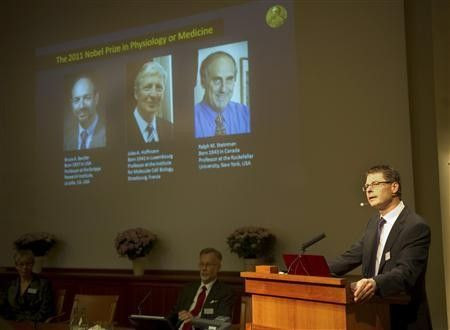The Science Behind Predicting Nobel Prizes

Predicting who will receive the Nobel Prize is an annual guessing game for some, for others, such as Thomson Reuters, it involves statistics.
Each year, the news organization announces its best estimate for the Nobel Prizes in chemistry, economics, medicine/ physiology and physics based on the number of times fellow scientists cite each other's work. The theory goes, the more times a researcher gets cited, the more important the work and the more likely a Nobel Prize will follow.
The inexact science was on display Monday when the Nobel Prize for medicine went to a trio of researchers including American Bruce Beutler and French scientist Jules Hoffmann who split the $1.5 million award with deceased Canadian-born Ralph Steinman, announced by the the Nobel committee at Stockholm's Karolinska institute.
Thomson Reuters got the prediction right about Beutler, the organization just got the year wrong: a predicted win in 2008 instead of 2011.
Since 1989, number crunchers at the media conglomerate estimate the likelihood a scientist has of getting awarded a Nobel Prize. So far, Thomson Reuters has gotten 41 predictions correct, according to their web site, with 2007 being a watershed year when the forecasters predicted five prizes correctly. Since its start in 1901, Nobel Prizes have been given out to 543 times to 840 people and organizations, according to the Nobel Prize website. That includes 193 award winners in medicine, chemistry, physics and economics since 1989, giving Thomson Reuters a success rate of 21 percent.
David Pendlebury, researcher for Thomson Reuters, told The Guardian he wouldn't bet on predictions.
If you only consider the top 0.1% of the most cited scientists in the world, that includes more than 1,000 researchers, Pendlebury told The Guardian before the Nobel Prize for Medicine was announced Monday. You can narrow it down but it gets harder and harder to differentiate their contributions. In the end, it rests with the individual preferences of Nobel committee members.
All predictions, including those remaining for the 2011 chemistry, economics and physics prizes are outlined here.
© Copyright IBTimes 2024. All rights reserved.





















